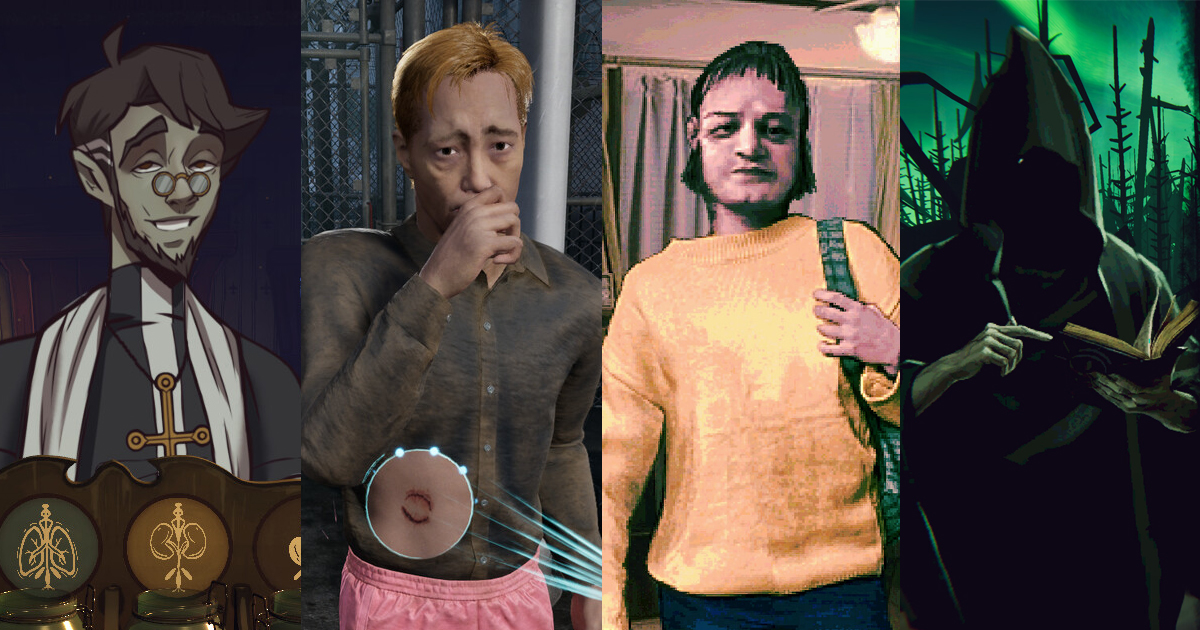Following in the footsteps of Papers, Please. Together with the creators of Do No Harm, Quarantine Zone, No, I'm not a Human, and Static Dread, we explore the reasons behind the popularity of the new trending genre
In the past year, several bright and successful successors of the iconic Papers, Please have emerged. We spoke with representatives of Darts Games, Brigada Games, Trioskaz, and Solarsuit Games about the popularity of this new direction and the challenges faced during development.
Given the number of projects inspired by the Papers, Please concept, should these types of games be classified as a separate genre? If so, what would you name it?
Novruz Javadov — Co-founder of Darts Games (Do No Harm)
I believe these games already distinguish themselves as a separate subgenre that developers refer to as Papers Please-like.
If I were to come up with a more unique name, I would call this subgenre a "narrative routine simulator," where seemingly monotonous mechanics serve as tools for unfolding drama, morality, and meaningful narrative choices.
Stas Starykh — CEO and Co-founder of Brigada Games (Quarantine Zone)
In my opinion, it is one of the subgenres of the "simulator" genre. I call this subgenre checkpoint games.
Answering the question: yes, as a subgenre, this direction should be highlighted (perhaps even as a separate genre). Many games have already sold millions of copies in this niche.
Nikita Veter — Co-founder of Trioskaz (No, I’m not a Human)
No, probably not. Why?
Dmitry Beley — Game Director at Solarsuit Games (Static Dread)
I think there's even a term for this — "bureaucrat simulator." However, when we were working on marketing, we noticed that headlines like "A Mix of X and Papers, Please" or "Horror with Elements of Papers, Please" work well on their own without additional terms. Therefore, it's perfectly fine to use the game's name as a hook. Besides, it’s immediately clear to the player and creates an instant emotional connection.
What do you associate with the popularity of this concept among developers?
Novruz Javadov — Co-founder of Darts Games (Do No Harm)
Firstly, the reason for the popularity lies in the low entry barrier: these games feature a single understandable and easily explainable routine-related mechanic.
Secondly, the success of the original Papers, Please, which created an audience looking for similar games. This made marketing easier. To promote such a game, a developer simply needs to start a sentence with "my game is like Papers, Please, but..."
Stas Starykh — CEO and Co-founder of Brigada Games (Quarantine Zone)
The popularity among developers is due to their recognition of the genre's popularity and the possibility of developing a game with a relatively small team and budget. The risk vs. profit is justified here.
Moreover, the releases of No, I’m not a Human and the upcoming Quarantine Zone will likely raise the bar, as often happens with developing genres.
Nikita Veter — Co-founder of Trioskaz (No, I’m not a Human)
Because of the perception that developing in this concept does not require much effort. In reality, there are simpler schemes.
Personally, I don’t feel this concept is popular. Friend-slopes are much more popular.
Dmitry Beley — Game Director at Solarsuit Games (Static Dread)
In terms of game design, it’s a good concept: a simple core gameplay mechanic that resonates with everyone: checking documents, following instructions, and dealing with consequences. Around this core gameplay, you can build a meta-narrative and tell amazing stories.
Additionally, the original's significant popularity is inspiring. Developers, especially indie ones, are players too. Often, we create what we want to make for ourselves, things that once impressed and inspired us. The short film based on Papers, Please was initially made by fans.
From the outside, this genre might seem simple and inexpensive to produce. How accurate is this perception?
Novruz Javadov — Co-founder of Darts Games (Do No Harm)
It depends on the budget. I believe any game by Lucas Pope (the creator of Papers, Please) is an ideal choice for cloning for indie developers.
The most challenging part of developing a spiritual successor to Papers, Please is designing the pacing and engagement. To prevent player boredom, a perfect balance between routine and surprise is essential. Plus, the narrative has to be woven into the routine so that every decision has consequences.
Stas Starykh — CEO and Co-founder of Brigada Games (Quarantine Zone)
You can create a game of any genre for $100,000 or for $10 million. It's the same here. But over time, the cost of development within the genre will definitely increase, as audience expectations will grow with new releases, and the old features won't surprise them anymore.
However, I think there will still be room for creative concepts and new mechanics that can be implemented on a small budget.
Nikita Veter — Co-founder of Trioskaz (No, I’m not a Human)
It can mistakenly seem simple.
Dmitry Beley — Game Director at Solarsuit Games (Static Dread)
We fell into this trap ourselves. We planned six months for Static Dread’s development, but then decided to deepen the ship mechanics and add document work to make a more direct nod to Papers, Please. Ultimately, this mechanic consumed almost all our development time, extending the project by another three months. Working with documents and cross-referencing them sounds simple, but it hides many pitfalls that we stumbled upon.
What challenges and pitfalls await developers of such games?
Novruz Javadov — Co-founder of Darts Games (Do No Harm)
The risks and problems we encountered, which partially led to a project rating of 74%, include:
- The risk of monotony. If the mechanics don't evolve, players quickly tire.
- Pacing. We added a time constraint that discouraged some of the audience.
- Testing. Manually checking all the branching paths and scenarios is very challenging. We couldn't automate this system within our company.
Stas Starykh — CEO and Co-founder of Brigada Games (Quarantine Zone)
I don't think there are any unique pitfalls for the genre/subgenre:
- If mechanics are new, they might not appeal to the audience.
- The risk of not achieving a consistent game design (having a set of mechanics without a cohesive game).
- The risk of exceeding the budget.
- The risk of not meeting audience expectations.
- The risk of not engaging influencers/creators, and so on.
Nikita Veter — Co-founder of Trioskaz (No, I’m not a Human)
Finding an interesting core loop and seeing the project through to release.
Dmitry Beley — Game Director at Solarsuit Games (Static Dread)
The main challenge is creating sufficient depth for a full game based on this mechanic without delving into the tedious verification of thousands of fields. This is resolved through proper planning and a well-thought-out design document. Before starting development, it's important to allocate plenty of time to this, including answering the question: what will players be checking in the first few days — that's clear, but what about the tenth day, and why won't they get bored by the fifteenth?
This concept inherently involves a repetitive cycle spread over 15-30 days. To ensure each day is enjoyable, they need to be well-planned in advance, even before development, alongside defining the scope.
How popular are such projects on Steam among players?
Novruz Javadov — Co-founder of Darts Games (Do No Harm)
They are not quite friend-slopes, but players appreciate routine games with narrative elements. If the concept is interesting, players will want to experience the role of a new character, similar to when everyone fell in love with the border guard character with a family from a totalitarian state in Papers, Please.
However, as always, quality is crucial. Specifically, in the discussed games, a high-quality narrative and pacing are critical. They play a decisive role.
Stas Starykh — CEO and Co-founder of Brigada Games (Quarantine Zone)
Looking at the wishlists and sales numbers of such games, they are popular NOW. There's no guarantee this will be the case in a year. So, if I were starting development on a game in the style of Papers, Please now, I would think twice. It needs something very outstanding to capture the audience, rather than being seen as "just another checkpoint" or "another Papers, Please clone."
Nikita Veter — Co-founder of Trioskaz (No, I’m not a Human)
Good question. It’s good that I’m not an analyst.
Dmitry Beley — Game Director at Solarsuit Games (Static Dread)
It largely depends on the game and genre. Since the mechanic itself is simple, you can adapt it to any game, even without direct documents. No, I’m Not a Human, for example, also uses the "rules — actions — consequences" mechanic. However, many games that directly involve working with papers remain unpopular.
For players, the most important thing is not the specific mechanic, but the new experience we can offer them and the unexpected use of a familiar mechanic. A new setting, an interesting story, a crazy visual style — if you can evoke emotions in players, the game will be in demand.
The original concept was purely social. Now it’s directly associated with horror. Why do you think this shift happened?
Novruz Javadov — Co-founder of Darts Games (Do No Harm)
Adding horror elements is one of the simplest ways to diversify the routine. The risk of monotony, which I mentioned earlier, is difficult to address in more original ways, so most developers take the simplest path by playing on the contrast between calm mechanics and Lovecraftian cosmic horror settings.
Stas Starykh — CEO and Co-founder of Brigada Games (Quarantine Zone)
Both directions — checkpoint games and horror games — are currently on the rise. The concepts "married" to enhance their effects.
Nikita Veter — Co-founder of Trioskaz (No, I’m not a Human)
Horror games, in general, are more popular with players because they are the easiest way to discuss human issues. This is something that players understand best.
Dmitry Beley — Game Director at Solarsuit Games (Static Dread)
Horror is a genre about working with emotions. And Papers, Please, despite being all about paperwork, effectively works with emotions. The reason is the "rule — action — consequence" cycle, which amplifies the emotions embedded in the narrative. If there are rules to follow, there’s punishment involved. It creates a fear of being punished and a fear of deviating from the rules. We can make decisions — responsibility emerges. In the end, the player faces the consequences of their decisions — the peak moment of all embedded emotions.
If you transfer this concept into horror, you can further enhance it with atmosphere and suspense, maximizing fears and consequences.
What developments do you expect from games in this new direction?
Novruz Javadov — Co-founder of Darts Games (Do No Harm)
So far, I haven’t seen any projects that could match the original in terms of depth and balance between routine, narrative, and emotion. Therefore, I expect to see new settings and unconventional professions. However, if someone could come up with a more natural combination of gameplay and story, where player choices not only affect the text or the ending but are reflected in the routine itself, I would be delighted. With Do No Harm, we didn't quite achieve this, but we’ll return to this genre in the second game in a year and a half (for now, we have another project, but within the same universe, underway until next year).
Stas Starykh — CEO and Co-founder of Brigada Games (Quarantine Zone)
I expect to see more complex/deep gameplay, the emergence of story-driven elements, co-op modes, and so forth. The subgenre will become more complex through the addition of new mechanics, and there will be genre-blending games. I think we'll start to see checkpoint mechanics in AA- and AAA-projects.
Nikita Veter — Co-founder of Trioskaz (No, I’m not a Human)
It’s hard to say. I don’t believe in anything and expect nothing.
Dmitry Beley — Game Director at Solarsuit Games (Static Dread)
Definitely, the genre is moving away from "paperwork" and shifting this concept into more casual forms. Currently, streamers are the main source of marketing for games, and when you have a lot of paperwork and text, it is difficult to stream and create entertaining content. There needs to be more fun, faster cycles, and striking consequences. It’s intriguing to see how Quarantine Zone will turn out: they have casuallified the concept by adding a zombie setting and gadgets for checking not just documents but people themselves. A similar approach was taken by developers of Contraband Police and several other projects. It’s interesting to see how this concept can be further developed to achieve even greater emotional impact on players.




